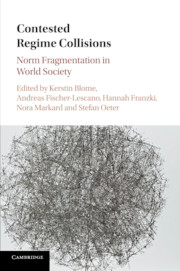Book contents
- Contested Regime Collisions
- Contested Regime Collisions
- Copyright page
- Contents
- Contributors
- Preface
- Contested collisions
- Part I Between collisions and interaction
- Part II Addressing collisions
- Part III Collisions otherwise
- 9 A critical theory of transnational regimes
- 10 Materialism of form
- 11 The dialectic of democracy and capitalism before the backdrop of a transnational legal pluralism in crisis
- 12 Putting proportionality in proportion
- 13 On the critical potential of law – and its limits
- Index
- References
9 - A critical theory of transnational regimes
Creeping managerialism and the quest for a destituent power
from Part III - Collisions otherwise
Published online by Cambridge University Press: 05 May 2016
- Contested Regime Collisions
- Contested Regime Collisions
- Copyright page
- Contents
- Contributors
- Preface
- Contested collisions
- Part I Between collisions and interaction
- Part II Addressing collisions
- Part III Collisions otherwise
- 9 A critical theory of transnational regimes
- 10 Materialism of form
- 11 The dialectic of democracy and capitalism before the backdrop of a transnational legal pluralism in crisis
- 12 Putting proportionality in proportion
- 13 On the critical potential of law – and its limits
- Index
- References
Information
- Type
- Chapter
- Information
- Contested Regime CollisionsNorm Fragmentation in World Society, pp. 255 - 280Publisher: Cambridge University PressPrint publication year: 2016
References
Accessibility standard: Unknown
Why this information is here
This section outlines the accessibility features of this content - including support for screen readers, full keyboard navigation and high-contrast display options. This may not be relevant for you.Accessibility Information
- 2
- Cited by
